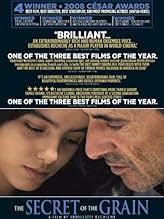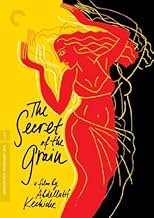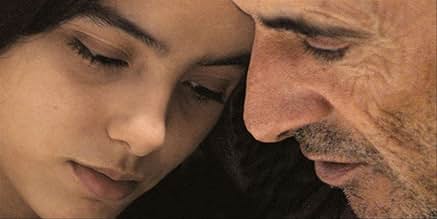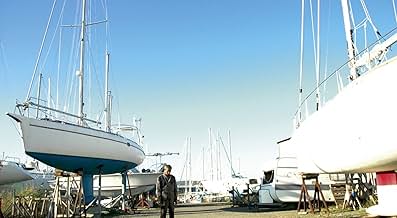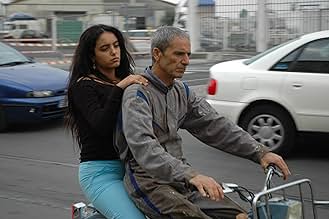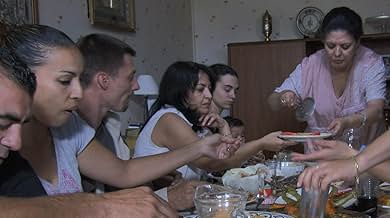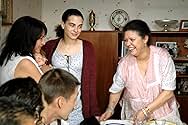IMDb-BEWERTUNG
7,4/10
8119
IHRE BEWERTUNG
Füge eine Handlung in deiner Sprache hinzuIn southern France, a Franco-Arabic shipyard worker along with his partner's daughter pursues his dream of opening a restaurant.In southern France, a Franco-Arabic shipyard worker along with his partner's daughter pursues his dream of opening a restaurant.In southern France, a Franco-Arabic shipyard worker along with his partner's daughter pursues his dream of opening a restaurant.
- Regie
- Drehbuch
- Hauptbesetzung
- Auszeichnungen
- 19 Gewinne & 9 Nominierungen insgesamt
Nadia Taoul
- Sarah
- (as Nadia Taouil)
Empfohlene Bewertungen
Abdel Kechiche's tragicomedy is a film of contradictions and contrasts. It is both quiet and boisterous, with a script that is both understated and energetic, and which explores (among other things) how communities both accept immigrants, and yet remain suspicious of them.
Couscous follows sixty-something Slimane Beiji, a Tunisian-French shipyard worker in the French port town of Sète, played with reserved dignity by Habib Boufares. Despite being divorced, Slimane still spends a lot of time with his ex-wife and their extended family. The rest of his time is spent with his girlfriend and her daughter, who own a quayside hotel.
When Slimane is laid off, it comes as the last straw in a life that has become increasingly redundant. Left with nothing to lose, he hits upon the idea of opening a restaurant on an old boat. The project becomes a focal point for Slimane's extended family: his sons lend a hand with the boat's renovation; his girlfriend's daughter helps acquiring the necessary bank loans and official documents; and his ex-wife will cook the restaurants signature dish the eponymous couscous.
The restaurant works as a symbol of the hopes and dreams of immigrants how all they want is to integrate and work in their new community, whilst still retaining the culture and customs of their homeland. But it also signifies the duality of a community's attitude toward immigrants. During a party thrown to promote Slimane's restaurant, the guests all compliment their host and try their hand at a little Arabic; and yet, when Slimane's back is turned, they whisper amongst themselves that "he's not from around here." But Couscous really shines in its extended scenes of dialogue. At several points during the film we join Slimane and his family as they sit in kitchens or dining rooms and do nothing but talk. And it is a joy to watch. The script shows an eye for authentic dialogue, meandering through topics as diverse as racism in the workplace, the extortionate price of nappies, and using Arabic in the bedroom. The genuine performances from the supporting cast draw us further into these scenes, and the cinematography keeps us there. The camera squeezes between family members, getting the kind of intimate close-ups that give a real impression of a loud family dinner.
This light-hearted attitude, present in the early scenes, contrasts with a grimmer final third, in which situations get progressively worse. And as things get worse, family relationships start to break down.
This also reveals the film's ultimate irony. Slimane's family is a close-knit unit when the members each live separate lives. But when the restaurant brings them together, family unity dissolves and they resort to serious bickering.
Couscous follows sixty-something Slimane Beiji, a Tunisian-French shipyard worker in the French port town of Sète, played with reserved dignity by Habib Boufares. Despite being divorced, Slimane still spends a lot of time with his ex-wife and their extended family. The rest of his time is spent with his girlfriend and her daughter, who own a quayside hotel.
When Slimane is laid off, it comes as the last straw in a life that has become increasingly redundant. Left with nothing to lose, he hits upon the idea of opening a restaurant on an old boat. The project becomes a focal point for Slimane's extended family: his sons lend a hand with the boat's renovation; his girlfriend's daughter helps acquiring the necessary bank loans and official documents; and his ex-wife will cook the restaurants signature dish the eponymous couscous.
The restaurant works as a symbol of the hopes and dreams of immigrants how all they want is to integrate and work in their new community, whilst still retaining the culture and customs of their homeland. But it also signifies the duality of a community's attitude toward immigrants. During a party thrown to promote Slimane's restaurant, the guests all compliment their host and try their hand at a little Arabic; and yet, when Slimane's back is turned, they whisper amongst themselves that "he's not from around here." But Couscous really shines in its extended scenes of dialogue. At several points during the film we join Slimane and his family as they sit in kitchens or dining rooms and do nothing but talk. And it is a joy to watch. The script shows an eye for authentic dialogue, meandering through topics as diverse as racism in the workplace, the extortionate price of nappies, and using Arabic in the bedroom. The genuine performances from the supporting cast draw us further into these scenes, and the cinematography keeps us there. The camera squeezes between family members, getting the kind of intimate close-ups that give a real impression of a loud family dinner.
This light-hearted attitude, present in the early scenes, contrasts with a grimmer final third, in which situations get progressively worse. And as things get worse, family relationships start to break down.
This also reveals the film's ultimate irony. Slimane's family is a close-knit unit when the members each live separate lives. But when the restaurant brings them together, family unity dissolves and they resort to serious bickering.
In his sixties, Slimane (Habib Boufares) is a disillusioned and tired man and, since his divorce from his wife, he has become a kind of free electron within his microcosm reduced to a community from North Africa. After an abrupt dismissal from the shipyard of the port of Sète, he quickly and naturally feels a sense of uselessness until having the unexpected idea and the strong desire to open a couscous restaurant, on a boat destined to scrap. His whole universe (family and friends) will progressively weld around this project which has become for everyone the symbol of a quest for a better life.
The director Abdellatif Kechiche is a perfectionist and creates with Couscous mit Fisch (2007) a film of atmosphere. It obviously takes time to describe the environment, the characters, the relationships between them, the issues, ... and thus allow the audience to immerse themselves in a universe that is not necessarily his (mine in all case): this is also the magic of cinema. Thus, the pace is deliberately slow, even very slow, with some scenes that may seem disproportionately long or even unnecessary. Nevertheless, from the beginning to the end, I was in total empathy with this Slimane.
As a synthesis: a movie as endearing as moving, as poignant as revitalizing. 7/8 of 10
The director Abdellatif Kechiche is a perfectionist and creates with Couscous mit Fisch (2007) a film of atmosphere. It obviously takes time to describe the environment, the characters, the relationships between them, the issues, ... and thus allow the audience to immerse themselves in a universe that is not necessarily his (mine in all case): this is also the magic of cinema. Thus, the pace is deliberately slow, even very slow, with some scenes that may seem disproportionately long or even unnecessary. Nevertheless, from the beginning to the end, I was in total empathy with this Slimane.
As a synthesis: a movie as endearing as moving, as poignant as revitalizing. 7/8 of 10
Diane and I attended this wonderful film in Fremantle this morning and both of us left the theater at its conclusion realising that we had seen an unusual film from an unusual ethnic angle and that the director and actors had completed a superb work.
I adore our Australian films because many of them explore the mundane drama of quiet ordinary life and this film is no exception even though it is French rather than Australian. I guess Hollywood does not believe viewers are sensitive enough to pay to see domestic drama and that the subject matter must always be "bigger than Ben Hurr" but our movies as well as many European movies have proved that the examination of quiet aspects of everyday life can provide extremely compelling material for contemporary films.
IMDb commentators found it off-putting to watch long film sequences about potty training, marital squabbles and restaurant scenes; however, this is the stuff of myriad similar domestic situations that we are all familiar with. The genius being that the director can make these scenes rich enough to watch. Diane and I both believe he did this admirably as well as providing much to discuss and reflect upon later.
We both found it different and endearing that we were allowed into the lives of people and their situations that would be closed to us without this delightful film. Yes, I used the adjective "delightful"; the scenes of domesticity were enlightening and compellingly endearing because we are inundated with Western examples of the genre but few (such as in this film) of other ethnic examples.
A film that should not be missed!
I adore our Australian films because many of them explore the mundane drama of quiet ordinary life and this film is no exception even though it is French rather than Australian. I guess Hollywood does not believe viewers are sensitive enough to pay to see domestic drama and that the subject matter must always be "bigger than Ben Hurr" but our movies as well as many European movies have proved that the examination of quiet aspects of everyday life can provide extremely compelling material for contemporary films.
IMDb commentators found it off-putting to watch long film sequences about potty training, marital squabbles and restaurant scenes; however, this is the stuff of myriad similar domestic situations that we are all familiar with. The genius being that the director can make these scenes rich enough to watch. Diane and I both believe he did this admirably as well as providing much to discuss and reflect upon later.
We both found it different and endearing that we were allowed into the lives of people and their situations that would be closed to us without this delightful film. Yes, I used the adjective "delightful"; the scenes of domesticity were enlightening and compellingly endearing because we are inundated with Western examples of the genre but few (such as in this film) of other ethnic examples.
A film that should not be missed!
It's the third movie of Abdellatif Kechiche (coming after "La Faute à Voltaire", and "L'Esquive"). All these movies deal in a way or another with the life of Tunisian immigrants in France.
This time in "Couscous" the director wanted to show his own background, the universe of his own family, Tunisian immigrants living in Nice, and especially he wanted to bring a tribute to his father, the man who had struggled for all his life to transmit a sense to all of them. It was not to be a biographical film, what Mr. Kechiche was looking for was to catch an atmosphere, and I would say, to catch the ethos.
The shootings have not been done in Nice, as the director feared to become much too sentimental. The chosen location was Sète instead, a small Mediterranean town, where the fishermen leave on their boats each morning and sometimes reach North Africa or the Asian borders, a town struggling with the same issues as everywhere in Europe nowadays: decline of production and unemployment, with the small shipyard challenged by concurrence, the fishing industry challenged the same.
The director had intended to ask his father to play in the movie and started to look for funding and to organize the team. Meanwhile the father passed away. Mr. Kechiche decided then to put a Tunisian actor in the role of the father. It was Mustapha Adouani, whom the director knew very well. Exactly when shootings were to start, Mr. Adouani fell gravely ill (he died after a few months), so they had to find on the spot another solution.
And the solution they found proved brilliant: they hired a non-actor, Habib Boufares, a worker from Nice, a lifelong friend of the father. The role fitted to him as a glove! Actually almost the whole team is of non-actors. The screenplay details were very loosely followed, the director left to the cast the full liberty to improvise. They were playing their own kind of life after all! And they lived their life there, in front of the camera (it was a hand-held camera , to not impede the non-actors in any way). This movie breathes trough all its pores of life, of authenticity, of immediacy! There are only a few professional actors in the cast. Hafsia Herzi (a young actress showing stamina and commitment) plays the step-daughter of the father, a very determined girl, sincerely attached to him and giving full support in difficult moments. There is also Alice Houri, bringing in a secondary role force and sincerity.
I have read the reviews to this movie. Many of them are very critical. The movie is excessively long, they say, and there are a lot of scenes that could have been much shorter without loosing anything. It is a 150 minutes film: one third is devoted to a dinner in family; the mother has prepared fish couscous (you could guess), an endless chat is about anything and nothing; a second third is devoted to a dinner on a boat-restaurant, where everybody is waiting for the main course (fish couscous, you betcha).
Well, it depends on your taste to like this movie or not (it goes the same with the couscous as a dish). I think the director took this risk, to let each scene to unfold on its own, regardless how long it was taking, for the sake of authenticity. He was interested in catching the universe of that community of Tunisian immigrants, in rendering it as natural as it really is; to get this way the ethos of that world. And he needed for this to not interfere in any way: neither by screenplay, nor by camera, nor by editing.
It is a family risking to disintegrate: the parents are separated, one of the sons is cheating his wife, there are tensions with the step-daughter. What keep them strong is the recourse to their specificity when need is: their cuisine, the wonderful plates with fish couscous. And their music and dance, in the most dramatic moments. There is a long scene of belly dance at the end of the movie: I don't want to say more, to not spoil the story. These guys speak only French and follow the French system of values. They keep however their cultural origins as assets.
Some reviewers mentioned "Eat Drink Man Woman" of Ang Lee: there also it is cuisine that keeps family against disintegration. I would mention also in this context "A Touch of Spice": a Greek family forced to leave Istanbul will keep their specific identity by keeping to "Politiky Kouzina", the way Greeks from Istanbul use spices in their dishes.
For me "Couscous" called in mind also "35 Rhums", another French movie whose heroes also belong to an ethnic minority in France.
I think somehow the family in "Couscous" and the movie itself resemble: both could disintegrate, both keep ultimately strong, the family keeping to their cuisine, the movie by keeping to the authenticity of this universe and by getting their ethos.
This time in "Couscous" the director wanted to show his own background, the universe of his own family, Tunisian immigrants living in Nice, and especially he wanted to bring a tribute to his father, the man who had struggled for all his life to transmit a sense to all of them. It was not to be a biographical film, what Mr. Kechiche was looking for was to catch an atmosphere, and I would say, to catch the ethos.
The shootings have not been done in Nice, as the director feared to become much too sentimental. The chosen location was Sète instead, a small Mediterranean town, where the fishermen leave on their boats each morning and sometimes reach North Africa or the Asian borders, a town struggling with the same issues as everywhere in Europe nowadays: decline of production and unemployment, with the small shipyard challenged by concurrence, the fishing industry challenged the same.
The director had intended to ask his father to play in the movie and started to look for funding and to organize the team. Meanwhile the father passed away. Mr. Kechiche decided then to put a Tunisian actor in the role of the father. It was Mustapha Adouani, whom the director knew very well. Exactly when shootings were to start, Mr. Adouani fell gravely ill (he died after a few months), so they had to find on the spot another solution.
And the solution they found proved brilliant: they hired a non-actor, Habib Boufares, a worker from Nice, a lifelong friend of the father. The role fitted to him as a glove! Actually almost the whole team is of non-actors. The screenplay details were very loosely followed, the director left to the cast the full liberty to improvise. They were playing their own kind of life after all! And they lived their life there, in front of the camera (it was a hand-held camera , to not impede the non-actors in any way). This movie breathes trough all its pores of life, of authenticity, of immediacy! There are only a few professional actors in the cast. Hafsia Herzi (a young actress showing stamina and commitment) plays the step-daughter of the father, a very determined girl, sincerely attached to him and giving full support in difficult moments. There is also Alice Houri, bringing in a secondary role force and sincerity.
I have read the reviews to this movie. Many of them are very critical. The movie is excessively long, they say, and there are a lot of scenes that could have been much shorter without loosing anything. It is a 150 minutes film: one third is devoted to a dinner in family; the mother has prepared fish couscous (you could guess), an endless chat is about anything and nothing; a second third is devoted to a dinner on a boat-restaurant, where everybody is waiting for the main course (fish couscous, you betcha).
Well, it depends on your taste to like this movie or not (it goes the same with the couscous as a dish). I think the director took this risk, to let each scene to unfold on its own, regardless how long it was taking, for the sake of authenticity. He was interested in catching the universe of that community of Tunisian immigrants, in rendering it as natural as it really is; to get this way the ethos of that world. And he needed for this to not interfere in any way: neither by screenplay, nor by camera, nor by editing.
It is a family risking to disintegrate: the parents are separated, one of the sons is cheating his wife, there are tensions with the step-daughter. What keep them strong is the recourse to their specificity when need is: their cuisine, the wonderful plates with fish couscous. And their music and dance, in the most dramatic moments. There is a long scene of belly dance at the end of the movie: I don't want to say more, to not spoil the story. These guys speak only French and follow the French system of values. They keep however their cultural origins as assets.
Some reviewers mentioned "Eat Drink Man Woman" of Ang Lee: there also it is cuisine that keeps family against disintegration. I would mention also in this context "A Touch of Spice": a Greek family forced to leave Istanbul will keep their specific identity by keeping to "Politiky Kouzina", the way Greeks from Istanbul use spices in their dishes.
For me "Couscous" called in mind also "35 Rhums", another French movie whose heroes also belong to an ethnic minority in France.
I think somehow the family in "Couscous" and the movie itself resemble: both could disintegrate, both keep ultimately strong, the family keeping to their cuisine, the movie by keeping to the authenticity of this universe and by getting their ethos.
Something unusual happened at the end of this movie projection. Several people not knowing each other gathered at the cinema exit and discussed the movie. It appeared that the movie was spoiled by several cinematographic tics which the director promoted to the status of the style and used all over the movie "ad nausea". He extends the lengthy sequences probably to make us share the uneasiness of the characters in the given situation (the mother scolding the child for weeing in her panties, the guests waiting for the cous-cous, the final run of Slimane and the belly dance). But this is a 0-level translation of the reality into the cinematographic language. The profusion of the very close-ups and the clip-like filming with very short shots is a minor default. It is probably one of the points which makes some people like the movie as "modern". The movie is almost twice as long as usual and I can not find any cinematographic reason to make it this long, if not just the desire to convince the spectator (and jury) that this movie has something exceptional. We spent some good moments but we hope that this gifted director will not be encouraged to belaborates more in his future creations.
Wusstest du schon
- WissenswertesShooting was supposed to start in the summer of 2005 but one of the leading actors was sick, which resulted in a major delay. Thus, filming actually started on 5 September 2005 and was still running by 16 January 2006. The set was on a boat in the port of Sète for at least six weeks from October to December 2006. Outside temperatures were very low, as opposed to what they should have been if schedule could have been held. This led the production to set up large tents near the boat with heating systems for the actors and extras to remain comfortable between takes.
- VerbindungenFeatured in Maltin on Movies: Flipped (2010)
- SoundtracksEl fan hob wa imane
Written by Mohamed Abdel Wahab and Hussein El Sayed
Top-Auswahl
Melde dich zum Bewerten an und greife auf die Watchlist für personalisierte Empfehlungen zu.
- How long is The Secret of the Grain?Powered by Alexa
Details
- Erscheinungsdatum
- Herkunftsland
- Sprachen
- Auch bekannt als
- The Secret of the Grain
- Drehorte
- Produktionsfirmen
- Weitere beteiligte Unternehmen bei IMDbPro anzeigen
Box Office
- Bruttoertrag in den USA und Kanada
- 86.356 $
- Eröffnungswochenende in den USA und in Kanada
- 9.850 $
- 28. Dez. 2008
- Weltweiter Bruttoertrag
- 14.776.783 $
- Laufzeit2 Stunden 31 Minuten
- Farbe
- Sound-Mix
- Seitenverhältnis
- 1.85 : 1
Zu dieser Seite beitragen
Bearbeitung vorschlagen oder fehlenden Inhalt hinzufügen

Oberste Lücke
By what name was Couscous mit Fisch (2007) officially released in India in English?
Antwort
